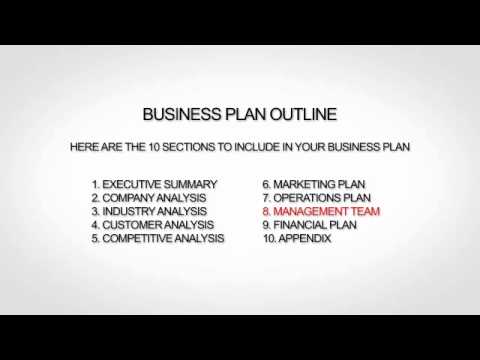Whether you’re just starting your video company, or if you’re already established and looking for further funding, you might need to provide a video production business plan. But how to write a business plan?
This article will take you through the steps necessary to create your video production business plan, and also give you some pointers and guidance on the dos and donts, as well as important things to look out for when writing it.
First, let’s look at the various situations in which you might need a business plan for your video company:
- You’re just starting out and looking to create a business roadmap of what you plan to do.
- You’re just starting out and approaching banks (or other investors) looking for money.
- You’re already some years into running your video company, but you need extra funding for one reason or another.
- You’re a veteran video production company owner, but your core business is changing and you want a new business plan written to help find a path forwards.
Your situation might be one of the above, or any combination of them. Whatever your reason for wanting to create a video production business plan, this guide will help you.
How To Make A Video Production Business Plan
Like when you’re working on a video project, creating a business plan is rendered easier when you plan things out and do the work ahead of time. Preparation is everything.
Planning is a thorough exercise, with a lot of research, decision making and effort. I’ve written a number of business plans for different businesses, including for my video production company. These are the most effective methods that have worked for me.
According to oneplanner’s Video Production Business Plan guide, there are 10 stages to a business plan:
Start With The Executive Summary
So, your initial step is really to sit down and think about your overall plan. I recommend working from top down, where you’re able to have a general idea of what you would like to have, your priorities.
And then work towards figuring out the details surrounding the central idea.
The central idea in business plan terms is what’s called the Executive Summary. This essentially is your pitch as to why you want to have your video business in the first place.
It definitely helps to make it catchy, but more importantly, it has to reflect what you really intend to execute in your business.
It would be good to already identify what your niche market and expected kind of output would be, and who would essentially be your target market: local companies, network channels, online businesses, weddings for brides and so on.
It will also benefit you here to drill down deep and go into exactly who your market is. As we’ve explained lots of times here before, it’s not just ‘local companies.’ It’s:
- ‘pet store owners in the greater Los Angeles area.’ Or,
- ‘jewellery stores in New York state. Or
- ‘Fortune 500 companies in the UK.’
Go deep.
What especially helps is highlighting what could set you apart from what is already being offered among your competitors. This is important here.
By the way, before we go much further, when researching this article I found a great Video Production Business Plan Template, complete with example sections written out. Get that here.
Who Else Are The Players In Your Market?
Are you aware of who else is offering a similar service?
If they’re reasonably local, or covering the same area as you, the you can consider them a competitor if they’re offering at least one of the same services as you.
For example, let’s say you run Bob’s Awesome Video Production Company and you have your local area wrapped up for corporate videos for local businesses.
It’s a thriving market and you make a good living making promo videos for local businesses, as well as filming events and conferences, etc.
Would you like to learn how to get more video production clients? Click the image below to get your free, downloadable guide to getting more video clients and growing your video company!
All’s well and good, but then a new video company open (let’s call them The Acme Video Company).
If The Acme Video Company start working in the same area and targeting the same kind of local businesses as you for video work, then you have a competitor.
So do this (especially when you’re just starting out and growing your company):
- Hop on over to your good friend, Mr Google (aka Big G).
- Type in your local area and then a keyword that describes what you do.
- For example, ‘los angeles video production’ or ‘corporate video london.’
- Note down your competitors in a spreadsheet. It’s a good idea to create as much info on them as you can. Consider this your ‘little black book’ of sorts.
Naturally, the smaller your city, or the area in which you want to work, the less competitors you’ll have.
No need to write down every competitor for your business plan. Just choose 5 of your biggest competitors.
As you work to continually develop your business plan, you’ll want to dig in deeper on thee players in the market, and what kind of businesses they run.
Knowing this information can help you evaluate how to set yourself apart, as well as how to compete with them.
Make An Assessment Of Your Production Company
Where does your video business stand?
This is a useful question to ask if you’ve been in business for a few years before creating your business plan.
If it’s a new video business, then you can adapt the question to something like, “What are my strengths and weaknesses?”
To answer this question, you may want to work with a SWOT analysis. A SWOT analysis is literally an assessment of your current state of:
- Strengths,
- Weaknesses,
- Opportunities for your business, and
- Threats that may affect your business.
Here’s a useful graphic courtesy of Finance New Mexico:
The discussion that goes into this should be a very objective one. It helps to analyze the general state of your industry.
The Strengths and Weaknesses focus on your potential video production company, while the Opportunities and Threats are an analysis outward. Don’t just look at personal strengths and weaknesses — look at the bigger picture.
While you go through this exercise, you may find what you can highlight (Strengths), how to improve (Weaknesses), what you can take advantage of (Opportunities), and what may stop your business from growth (Threats).
As from an effective part of a good business plan, this is also a great learning exercise for any business.
While this is a popular method, you also can look into other methods for analysis, like:
- the Boston Consulting Group Matrix,
- the PEST model, and
- the 7S.
These tools will help you drill down further into the true intent of your video production business.
Roll Out Plan
So now that you have a good idea of what kind of business you want, think further about how you intend to roll out your business, once you have started.
Like many businesses, in the beginning money can be a big issue. Clients come in at a trickle until you’re well known and start getting referrals, and Mr Taxman always wants his piece.
Do you want to start up with an office for your video production company, or do you intend to try to keep overhead as low as possible, by setting up in your garage?
Evaluating your location and set up is just one of the considerations you have to think of, as well as things like any employees that will be working with you.
Ultimately, you want to detail how the business works from Day 1 onwards. This is of course assuming that you continue your business for the short and long term.
Certainly, you can avoid the worst mistakes, like shutting down your business even before it starts. A good ‘roll out plan’ helps to prevent crazy scenarios like that.
How Do You See Your Finances?
Let’s talk about money. A video production business needs capital.
You don’t create things out of nowhere, and you can’t buy your necessary video production equipment with no cash. Management and anticipation of the cash flow is one thing. How to get the money is another. And you need to plan effectively for both.
With writing out how you intend your cash flow to be, this lets you see how money is going in and out of the business.
What does this look like?
- You make a projection of how you anticipate your money coming in, through video work, etc
- You identify the target frequency and amount of the video projects you work on,
- You describe how you’ll repay any debt you will be carrying, as agreed on, and
- How you intend to make payments.
This is another method to see if your video business model is really sustainable for the long term, and it gives you financial targets per period to stay afloat.
It’s about this time that mentioning an accountant is pretty important. So, consider it mentioned.
Also, get used to using a spreadsheet. You should know Excel inside out. It should become your new best friend, even if you pay an accounting to do the heavy lifting.
Knowing your numbers is key to your success.
For many, this may be a bit scary, because you’re asking big, crazy questions and your answers might not necessarily resonate as ‘true’ to you right now.
Also, commitments. Lots of people have issues with commitments. And you’re going to be making commitments on lots of things. Some not all are listed below:
- how to track your expenses, and
- how you build your company to make more income,
- where your revenue is coming from.
That is why it’s necessary for you go over the finances, even before you have started.
With this outlined in the plan, you also give visibility the baseline of how much money you would need to start out your business.
How Will You Go About Marketeting Your Video Business?
To augment your Financial plan, and further solidify the justification of how revenue and projects come in, think about how you want to market your video production business effectively.
A business is only as good as its network and its reputation. Let’s start with some questions like, how will you ensure that people, especially your target market, is aware of your new video production business?
If you have a good network already, it would be great to highlight that you are now open for business, and you are willing to create videos for them.
Some video production companies start with an ‘early bird’ rate, where clients can call for a project and get your awesome services at a discounted rate. This is sometimes a valid option when you’re just starting out and need to build your portfolio.
Remember, you are always promoting and marketing your business, through your projects and the relationships and network of people that you talk to, whether business or personal.
Your website and the marketing materials you produce are also key to your success.
You, and your team, are the initial walking advertisements for your video production business, so make a conscious effort to market your business in the most effective ways possible and leave no stone unturned in your efforts.
What Do Your Daily Management Activities And Operations Look Like?
Ultimately, planning the day-to-day events also need an initial plan. How you plan to run the daily operations of your video business helps you solidify both your finances and your marketing. Which, as we already mentioned, are integral parts of your business plan.
Some things to ask yourself:
- Are you going to set aside fixed hours a day building your network?
- Do you intend to work with an accountant to ensure that your accounts and expenses are being tracked regularly?
- Are you going to be outsourcing some of the services you offer?
- Are you going to be renting cameras and other equipment?
- Will you be taking on a permanent staff for your videos, or will you just get your regular specialists on a per project basis?
It definitely is essential to know these things, which are closely linked to the other parts of your business plan.
How To Write A Business Plan — A Conclusion
None of the parts of your video production business plan work in isolation. In fact, they are co-dependent on each other. Your business plan (and your business) will suffer from a lot of handicaps when you haven’t drilled down to the specifics.
I have walked you through the high level of the Executive Summary, down to the everyday plan. In between, we’ve covered managing your marketing and understand what assets you currently have, as well as figuring out how your finances relate to everything else in your business.
With these initially outlined, take more time to review everything again. Get an opinion from a trusted friend or colleague, especially if they have business experience.
Is everything finely tuned and on-point? If not, make a few tweaks here and there to make this business plan a well oiled machine. A great business plan should be part thrilling story and part selling machine. It should be intriguing and entertain the reader to a degree, but be a selling machine (selling you and your business) that really knows its numbers effectively.
Once you have finished, you are ready to discuss your video production business plan with banks, potential investors, etc!
But writing a great business plan is only part of the battle. How you must prepare for any questions that they may ask to clarify further what you have created.
I hope this article has shown you how to write a business plan.
Wishing you the best for setting up your new business, and I look forward to seeing your success! 🙂
Have you written a business plan before? Have you got funding after presenting a bank, or other funding source, with a business plan for your video company? Let us know in the comments just below here.
Matt Crawford
Related posts
10 Comments
Leave a Reply Cancel reply
This site uses Akismet to reduce spam. Learn how your comment data is processed.












Awesome, great explanation!
Thanks, man.
Thanks for sharing this article. Writing a business plan for video production is a bit hard. This article is a big help for me. I’ll follow what you said here to do it faster and easier.
Absolutely! Thanks for commenting!
This is a great article! I’m a filmmaker myself and I’ve been trying to write a business plan for years. This is a great starting point.
Thanks, Mitchell.
This is a great article! I’m a filmmaker myself and I’ve been trying to write a business plan for years. This is a great starting point.
Best of luck, Mitchell!
Great post! As a video production company owner, I found step 5 to be the most helpful in outlining the financial projections for my business. It’s important to have a clear understanding of the costs associated with starting and running a video production company in order to create a realistic financial plan. I will definitely be using this step as a guide in creating my business plan. Thanks for sharing!
Appreciate the comment